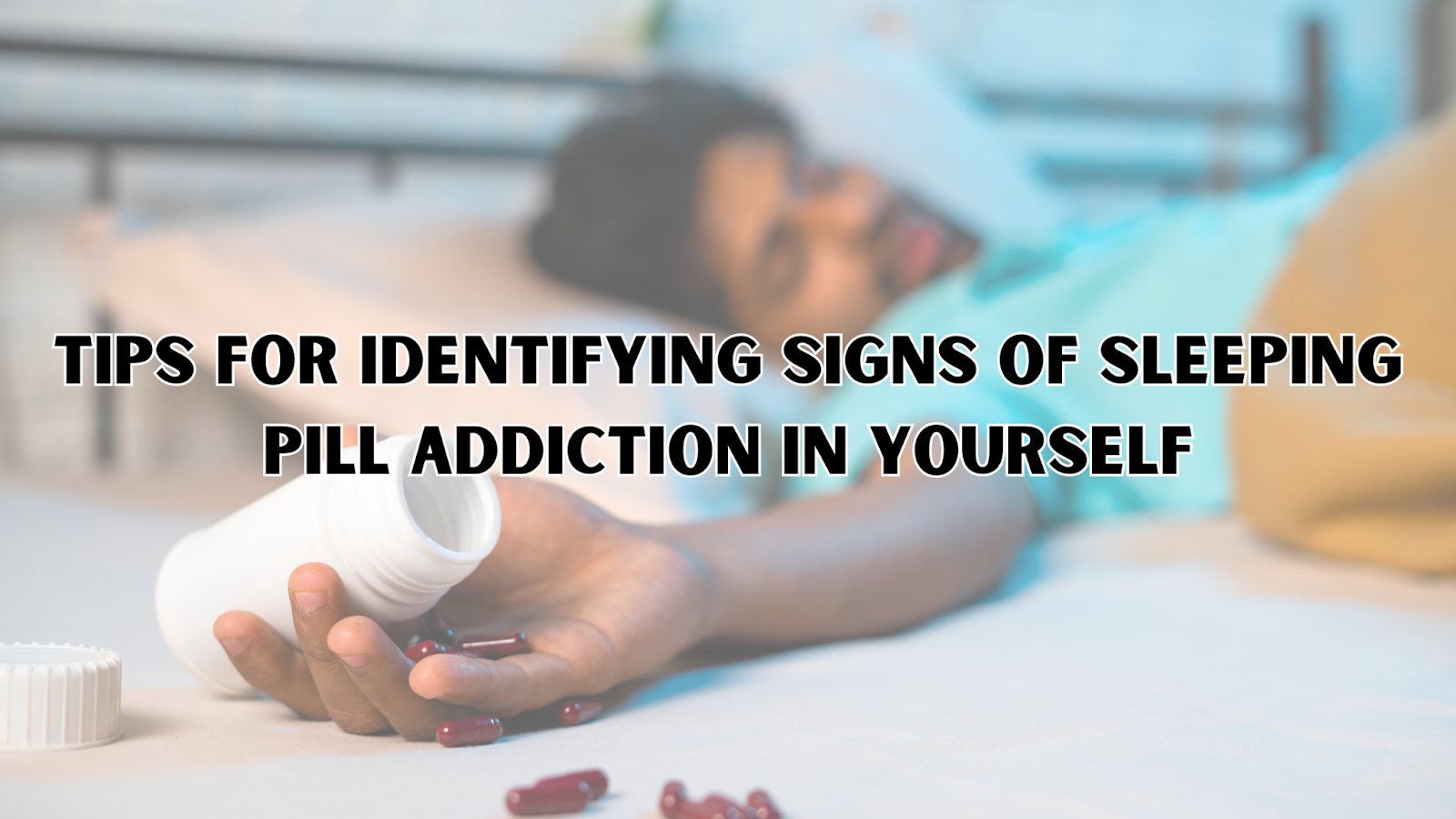Tips for Identifying Signs of Sleeping Pill Addiction in Yourself
Are you struggling to get a good night’s sleep, and finding yourself relying on sleeping pills more frequently? If so, you are not alone. Countless individuals grapple with sleeping pill addiction, often unaware of the early indicators.
This guide will dive into the subtle signs of dependency, the physical and psychological impact, and the steps you can take to overcome this challenge. Whether you are concerned about your usage or worried about a loved one, the information provided can help you identify the problem and start on the path to reclaiming your health and well-being.
Through a better understanding of the risks and available solutions, you’ll be empowered to take back control and rediscover the restful sleep you deserve.
Recognizing Early Warning Signs
Recognizing Early Warning Signs
Addiction to sleeping pills can often begin subtly, with regular use simply to induce sleep. Over time, however, the need for these medications can grow, leading to increased tolerance and the escalation to larger doses. In Virginia, individuals first notice that they rely on sleeping pills more often than intended, gradually needing them to fall asleep.
Pay close attention to the early warning signs, as they can signify the beginning stages of dependency. These signs include a growing preoccupation with acquiring and taking the pills, difficulty stopping despite wanting to, and the need for higher doses to achieve the same effects. As reliance on sleeping pills increases, individuals may find themselves spending more time and effort securing a steady supply of the medication, neglecting other areas of their lives in the process.
If you are noticing these signs, it’s important to reach out to a primary care physician richmond va, who can provide guidance and support in addressing this issue early. Recognizing these early indicators is crucial, as addressing the problem proactively can make all the difference in preventing a full-blown addiction and its devastating effects on one’s physical, mental, and emotional well-being.
Understanding Physical and Psychological Symptoms
As dependence on sleeping pills grows, both physical and psychological symptoms can emerge. Recognizing these signs is crucial for understanding the impact of sleeping pills addiction on the body and mind.
Physical Symptoms
Some of the physical symptoms associated with sleeping pills addiction include dizziness, leaving individuals feeling lightheaded or unsteady on their feet. Constipation, characterized by difficulty having regular bowel movements, is another common issue.
Memory problems, such as lapses in memory or difficulty concentrating, can also arise. Additionally, severe withdrawal symptoms like seizures and delirium can occur when attempting to quit the medication, underscoring the need for professional medical support during the detox process.
Psychological Symptoms
In addition to the physical toll, sleeping pills addiction can also take a significant psychological toll. Individuals may experience a growing apathy towards interests they once enjoyed, such as hobbies and social activities.
The neglect of responsibilities at work, at home, or in personal life is another hallmark of the psychological impact. Defensive behavior, where the individual becomes evasive when confronted about their medication usage, is another concerning symptom.
The combination of these physical and psychological effects can make it increasingly challenging for individuals to function effectively in their daily lives, further emphasizing the importance of seeking professional help.
The Link Between Mental Health and Sleeping Pill Addiction
Underlying mental health conditions can play a significant role in the development and perpetuation of sleeping pill addiction. Individuals struggling with issues like anxiety, depression, or insomnia may initially turn to sleeping pills as a way to cope with their symptoms, but over time, this dependence can spiral into a full-blown addiction. The chart below illustrates the prevalence of various sleeping disorders, which is one of the reasons people turn to sleeping pills.
The bidirectional relationship between mental health and sleeping pill addiction is critical to understand. While mental health conditions, such as anxiety and depression, may contribute to initial reliance on sleeping pills, the addiction itself can worsen these underlying issues. The sedative effects offer temporary relief, but they don’t address the root causes and can further deteriorate mental and emotional well-being over time.
A comprehensive treatment approach, combining therapy, medication, and lifestyle changes, is essential to tackle both mental health and addiction. By addressing both aspects, individuals can achieve lasting recovery and improved overall well-being.
The Dangers of Long-Term Use
The long-term effects of sleeping pill addiction can be severe, with parasomnias being a major concern. These include dangerous behaviors like sleepwalking, sleep-eating, or sleep-driving, often without memory of the actions. The risk is heightened when combined with substances like alcohol, leading to overdose, respiratory depression, and other life-threatening complications. Addressing these long-term dangers is vital to protect one’s health and quality of life, as the consequences of addiction can be far-reaching and potentially fatal.
Steps to Address and Overcome Addiction
Addressing and overcoming sleeping pill addiction requires a multifaceted approach, often under the guidance of medical professionals. Strategies for safely reducing dependency can include:
Tapering Dosages
Gradually reducing the dosage of the medication over time, under the supervision of a healthcare provider, is a crucial step in minimizing withdrawal symptoms. This process involves carefully watching the individual’s response to the decreasing doses.
You must make adjustments as needed to ensure a safe and comfortable transition away from the sleeping pills. The goal is to slowly wean the body off the medication, rather than abruptly stopping, which can lead to severe and potentially life-threatening withdrawal effects.
Treatment Options
In addition to medical management of withdrawal, exploring various treatment options is crucial for addressing the underlying causes of addiction. Therapy, such as cognitive-behavioral therapy (CBT) or group counseling, alongside specialized addiction programs, can offer comprehensive support. A multidisciplinary approach combining medical, psychological, and social support is highly effective in promoting long-term recovery. While the journey may be challenging, with the right guidance and resources, individuals can overcome sleeping pill addiction and regain their health and well-being.
EMR vs. EHR Systems for Tackling Sleeping Pill Addiction
While both Electronic Medical Record (EMR) and Electronic Health Record (EHR) systems can play a role in addressing sleeping pill addiction, they have some key differences in their capabilities:
| Feature | EMR | EHR |
| Scope | Focused on diagnosis and treatment within a single practice | Provide a comprehensive view of a patient’s health across multiple healthcare settings |
| Data Accessibility | Limited to the clinical data generated within that specific practice | Enable better care coordination and continuity of care across different providers |
| Advanced Features | Typically lack advanced features like decision support and population health management | Offer sophisticated tools for clinical decision-making, monitoring, and care coordination |
| Integration | Limited to the individual practice, with minimal integration across healthcare settings | Facilitate seamless information sharing and collaborative care among providers |
For individuals struggling with sleeping pill addiction, an EHR system may be more beneficial because it can facilitate better care coordination, provide more comprehensive patient data, and offer advanced features to support addiction treatment and recovery.
The Role of Social Support and Accountability
Overcoming sleeping pill addiction is not a solitary journey, and the support of family, friends, and loved ones can be invaluable in the recovery process.
Building a Supportive Network
Building a strong social support network can provide the encouragement, accountability, and practical assistance needed to navigate the challenges of addiction recovery. By surrounding themselves with individuals who understand the struggle and are committed to their well-being, individuals in recovery can draw strength from the collective experience and find the motivation to persevere through difficult times.
The Role of Family and Friends
Family members and close friends can identify early warning signs of sleeping pill addiction, confront the individual, and offer to help seek professional treatment. Their continued involvement and emotional support can maintain motivation and prevent relapse during recovery. Loved ones can provide a listening ear, and a supportive environment, and hold the individual accountable, vital for long-term recovery.
Conclusion
Recognizing the signs of sleeping pill addiction is the crucial first step in regaining control of your life and overcoming the addiction. By understanding the early warning signs, the long-term dangers, and the treatment options available, you can make informed decisions and begin your journey toward recovery. Remember, you don’t have to travel alone – reach out for support and take the necessary steps to overcome this addiction and reclaim your health.
Frequently Asked Questions
- What are the first signs that I might be developing a dependency on sleeping pills?
Increased tolerance, preoccupation with acquiring and taking the medication, and difficulty stopping despite wanting to are early indicators of a potential sleeping pill addiction.
- How can I tell if my sleep medication use has become a problem?
Physical symptoms like dizziness, constipation, and memory issues, as well as psychological signs such as apathy towards interests and neglect of responsibilities, suggest your sleep medication use has become problematic.
- What are the long-term risks associated with taking sleeping pills for an extended period?
Long-term use of sleeping pills can lead to severe health consequences, including the development of parasomnias (complex sleep behaviors) and dangerous interactions with other substances like alcohol, which can be life-threatening.

Deepak Sharma
Namaste! I’m Deepak Sharma, the creative mind behind SocialFunda, your go-to hub for Facebook bios, captivating captions, Instagram bios, and a treasure trove of Hindi Shayari. As a digital enthusiast, I am passionate about curating content that adds a touch of flair to your online presence.







